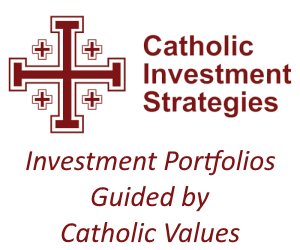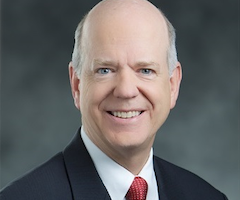Column: The Catholic Investor
I began transforming into a Catholic investor while working as a portfolio manager for Northwestern Mutual Life. I had been a pro-life Catholic for a long time and was serving on the Wisconsin Right to Life Board of Directors. A stockbroker I worked with regularly approached me with a new idea for a stock to buy. As he was telling me about the great potential for gain this company presented, I realized that a large portion of its business revolved around contraceptive drugs. He finished his case for the stock, and I politely said that I would pass on the opportunity.
That single incident opened my eyes to the fact that there were companies that I could not, in good conscience, invest in, whether for myself or for my employer. To do so would be a betrayal of my religious convictions and the countless individuals who might be harmed by the actions of those companies. And, so, I began excluding companies from consideration on a case-by-case basis.
As fate would have it, some years later after I had left Northwestern, I was asked to join a group buying an investment management business. One of the chief attractions to me was that this business offered Catholic oriented investment options. Intrigued, I became a partner in the venture.
Since I was the partner most interested in the Catholic side of the business, I was put in charge of developing it.
The first step was understanding how the companies that should be avoided were being identified. The answer was, and is, that we follow the Socially Responsible Investment Guidelines of the U.S. Conference of Catholic Bishops (USCCB).
It was truly a relief to learn that there is an existing authoritative framework to rely on when making decisions on which companies to avoid! However, I quickly realized that while the bishops had provided a framework, they most decidedly did not provide a list of unacceptable companies, and the investor wishing to follow the guidelines was left to their own devices.
But choosing which companies to exclude from client portfolios was only part of the task. The guidelines make it clear that more is expected. The excluded companies make up just a fraction of the companies with investable stocks.
Even more daunting is the call by the bishops to remain vigilant with the companies that are not excluded. If those companies are involved in any business practices that go against Catholic teaching, investors are meant to be advocates for remedial change. This would require not only countless hours of research, but also time spent in contacting and discussing issues with the companies in need of guidance.
The way we solved these twin problems was outsourcing them to a team of professionals whose sole business is tracking companies in terms of the USCCB guidelines and the active engagement of those that need to make changes to their operating policies. By utilizing consultants focused exclusively on this work, we can provide clients with USCCB compliant portfolios while still being free to do what we do best, provide excellent investment management and client service.
As an individual investor, your initial action should be to familiarize yourself with the bishops’ investment guidelines. The newest version of the guidelines, adopted in November of 2021, can be found here.
RELATED RESOURCES:
- Socially Responsible Investment Guidelines of the U.S. Conference of Catholic Bishops
- Catholic Investment Strategies
———
Thomas "Tom" Carroll, CFA, is the president of Catholic Investment Strategies, a position in which he has passionately enjoyed serving since 2012. Prior to this position,... MORE »



You must be logged in to post a comment.